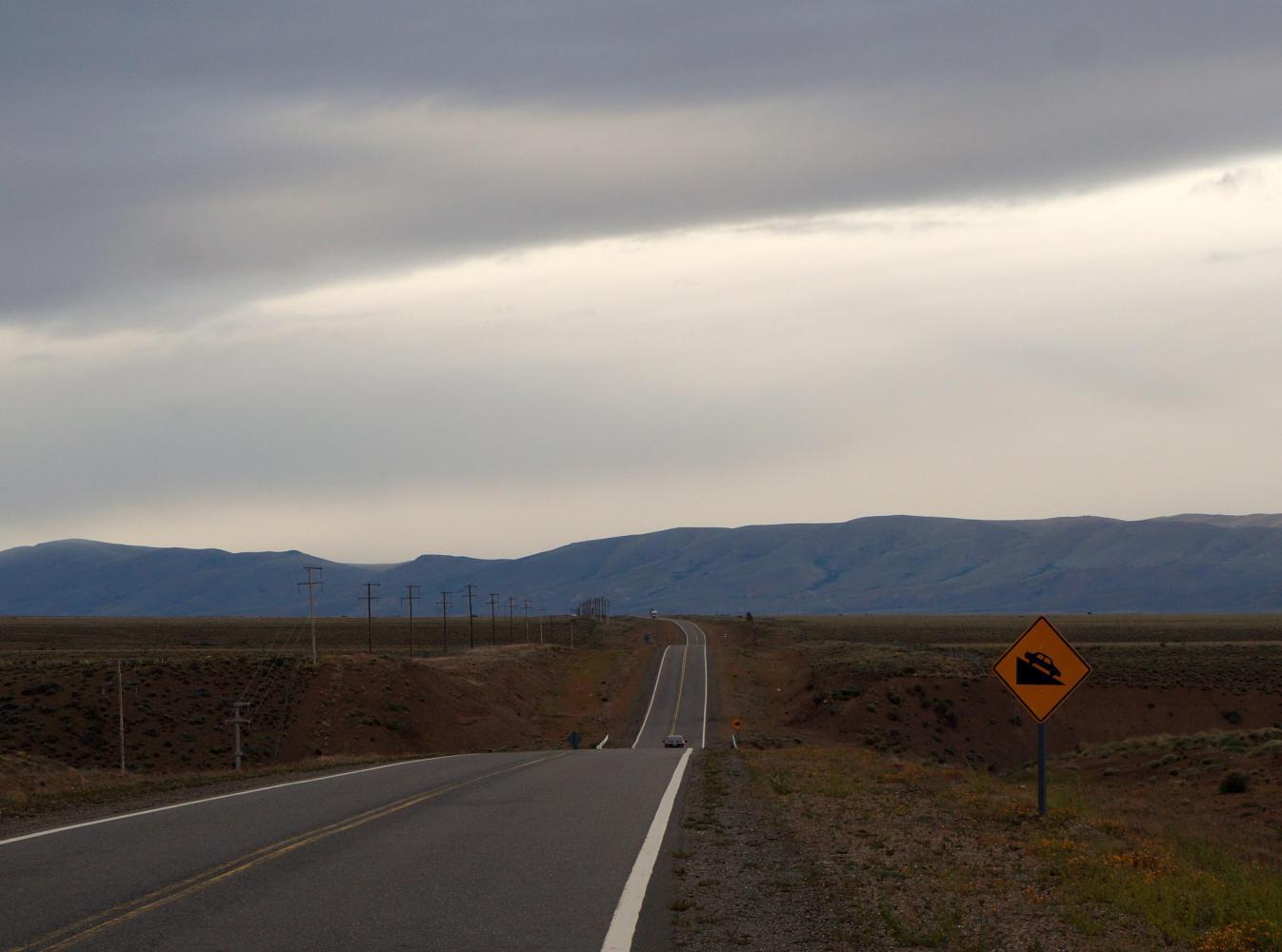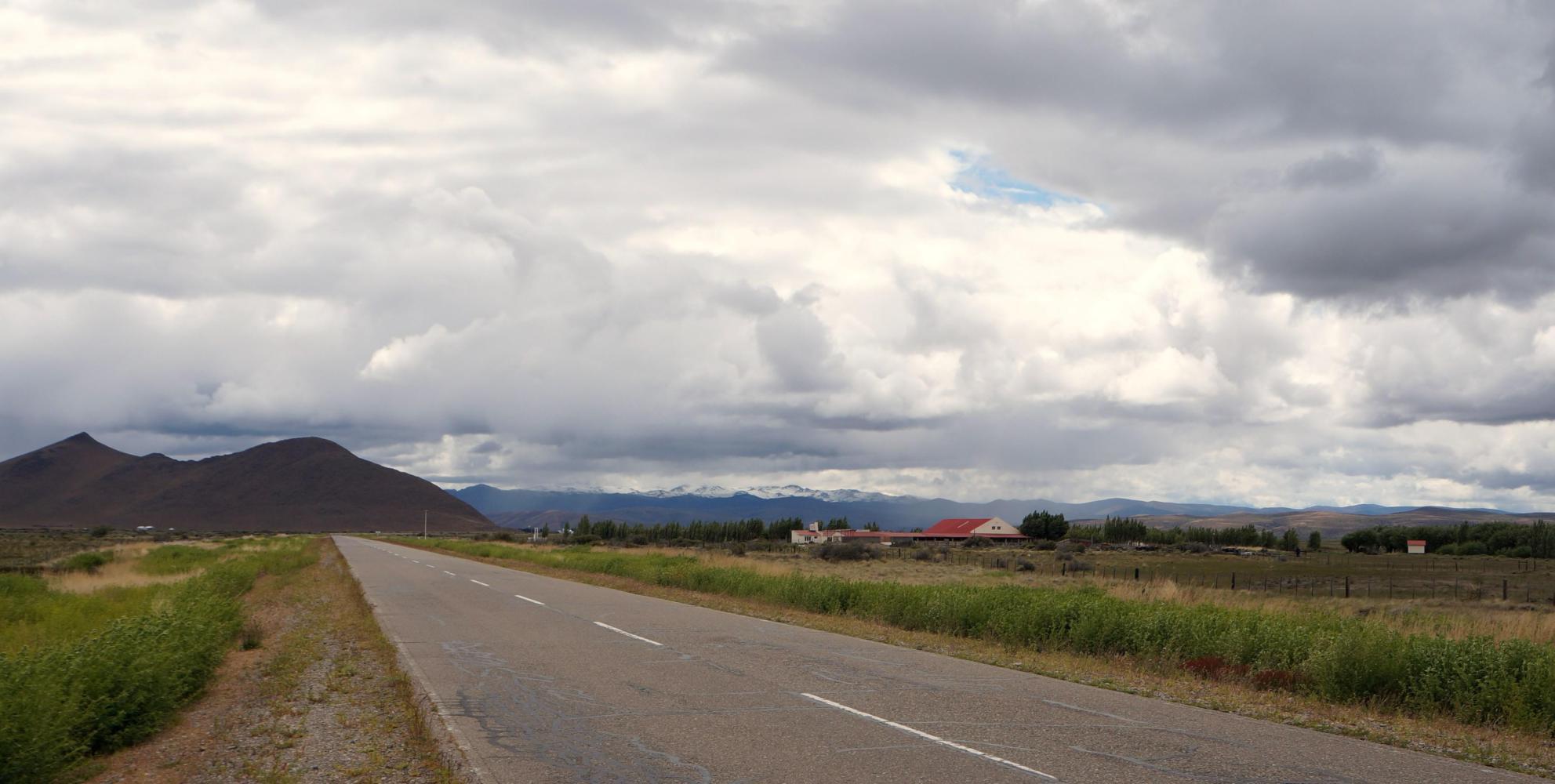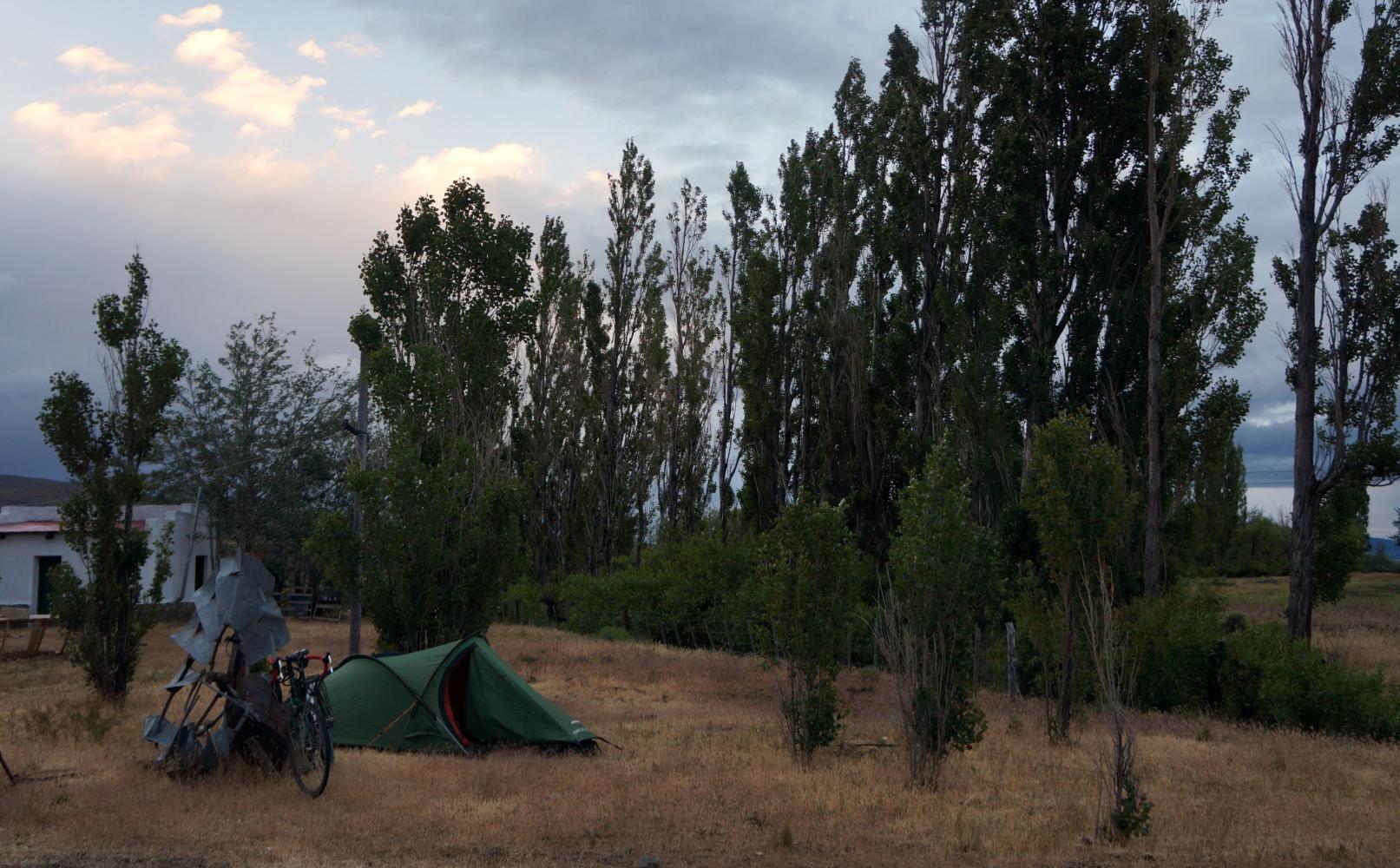December 17, 2015
Hospitality: Culvert Camp to Estancia El Condor

| Heart | 0 | Comment | 0 | Link |
Cocooned in a warm sleeping-bag I'm completely unaware of the morning's weather. It is a sunny start. It isn't until I unzip and get out that I feel how cold it is, so put on my warm down-jacket. Later I find ice in the water bottle and have to spend time warming numb fingers after washing out in cold water the pan used to make porridge.
The sun though just makes a brief appearance between the hills and a dark cloud bank that is enveloping the whole sky from the west, not boding well for the day ahead. And before taking the tent down the electric lines strung from poles that follow the road are making that familiar singing howl as the wind picks up.
I don my warm hat and thick winter gloves and raincoat and set off. I haven't got far when I wonder how I would do without them, the rain having come on in steady dripping of icy drops. Before long all is bleak brown blending into a mist of dirty grey. The road a black soaking sheen. The traffic light, being mainly Chilean trucks at regular intervals that swing over onto the opposite side of the road when passing to avoid drowning me in spray and give a friendly hoot at being out on such a morning. The rain turns to sleet and on a stretch further, the road is white with sloppy fresh snow. Even with my warm garb, it only holds out the chill so long. It's a case of holding on and pedalling to keep warm as my teeth chatter.
To cheer myself up I sing the Band Aid song "There won't be snow in Argentina this Christmas time. The greatest gift he'll get this year is a kick up the backside. Does he know it's Christmas time at all! Ah all, all dah all. Cheers to him writing a journal for us to read.......And tonite thank gad its him instead of you!"
Further on toward Gobenador Costa, the sky has mellowed somewhat, but continues pouring down. The steppe has given way to greener river valley with sheep estancias enclosed in tall tree windbreaks. And to the right at one point, hundreds of sheep look up in curiosity at me passing.
I write now from the warmth of the YPF petrol station café in Gob Costa, having had a coffee and two media lunas pasties. I've plugged the camera in to charge. And hope the weather clears up for the afternoon, otherwise I'll be going to the town campsite. The weather is on the TV. Wet just about everywhere today. Tomorrow brighter. Same for Saturday. And sunny on Sunday.
As there's no let up in the rain. I look out at puddled street with an occasional pickup truck slush pass with a sheep dog in the back. I've time to plug my computer in to charge once the camera is fully charged. And as it's lunchtime I get a sandwich, a cost I can least effort due to limited cash.
I look at my ACA map and consider possibly turning west from Rio Mayo, to cross into Chile, to the town of Coyhaique, which I could reach in about four days. There, I would be able to get money from an ATM. Having been there twice already, it's a town I like, mainly for it's surrounding natural beauty. And, it has all services: a descent bike shop, my rear-hub is making a constant metallic click this morning, meaning it needs repacked with grease. There's a good hostel. It would be a detour in which I would return back to route 40, perhaps via the Lago Posados area, directly west of Bajo Caracoles.

| Heart | 0 | Comment | 0 | Link |
The rain stops around two, though with heavy showers ahead and there's a sturdy crosswind riding out of town, where, I consider chickening out and turning for the municipal campsite on the south side of town, but remain resolute, wanting to make up some distance if nothing else.
The road continues straight for neighbouring town, San Martin, while 40 turns right in to a headwind for a bit before swinging left to continue parallel south as previously. Then a dark shaft of rain moves in. A heavy shower hammering it down. I pull in on an old road loop around a rock cutting and lay in among the rocks until it passes. When it does, I consider pitching the tent as there's plenty of level area between the old earthen road and rocks, where it is hidden from the modern road, because there's more rain on the way.
That rain amounts to little more than a few spots and it turns into a late afternoon blend of moving heavy rain cloud and brightening holes of blue sky. But I've decided to call it a day early as there are plenty more old road loops; and, having cycled this road before, know that ahead camping isn't easy, as it becomes expansive fenced in scrubland for a long way.
I have just come to what I'm looking for: an old road to the side going behind rocks and have stopped to check it out, when a slowing pickup truck passes and pulls to a halt on the verge. Oh no, all I need when I'm about to dodge into a hidden campsite. Nevertheless, remaining calm I cycle up to the driver who has gotten out. A small man in his sixties with a face the colour of leather.
"Necessito algo?" he asks. "No" I reply "Gracias. Tengo aqua y comida." I point at the full pannier.
He introduces himself "Guelermo"(my misspelling); Spanish for William. And goes on to say that he owns an estancia in the trees, pointing at a stand of tall Alamos a kilometre on and if you need anything call in. Can I camp? I ask. Yes, of coarse, he replies.
He drives on ahead slowly as I cycle behind and turns off left through a gate down a rough gravel drive to a house in the trees a few hundred metres further and turns into a yard on the eastside of the house facing away from the prevailing wind. We are met by an assortment of sheep dogs. In the gallery porch which runs the whole length of the house, there's a generator, a pile of firewood blocks and numerous other odds and ends, where three gauchos, short stocky Asiatic featured native americans in baggy trousers and one with a big light blue beret with red patterned ring in the middle, stand chatting while waiting to sign off for the day, but break off to greet Guelermo getting out of the pickup. Then a senior looking gaucho appears round the corner with another, who Guelermo later explains is Raul, chef of all the "trabajadores" workers, a pure Arranchian Indian.
I expected to be shown a place to pitch the tent, perhaps in the Alamos enclosed meadow on the side of the house facing the road, but Guelermo has other ideas. He proudly wants to show me around the farm.
He introduces me to his cook who has come out of the house at this moment, a fair skinned middle-aged man; a man of Irish ancestry he tells me, breaking briefly into English in a faint Irish accent of his roots "you speak English, senor?"
The yard is full of big puddles from the day's rain and the usual sheep farm smell of sheep urine, where we cross to a large area of pens and drafting races opening into a large corral full of sheep. Guelermo calls them "ovejas (sheep) Merrino Australiano". They've been gathered up today and tomorrow we will be tagging them with the farm identification mark. We also have "vacas" cows. They are over by the river. On a pole rack are stretched out cowhides. He also shows me where they kill animals for the house.
He drives me the short distance to a large shed back up by the road entrance, and slides the door open to a clipping area. In a corner he shows me this year's wool bales rapped in plastic and labelled "Est El Condor", and says there are twenty-five tonnes. We then get back in the pickup and he drives across route 40, gets out and opens a wire gate and returns and we drive along a cart track further through scrub up through hills, then down steeply into a great hollow, opening into a small boggy valley. We cross the bottom and Guelermo explains as he carefully steers over bumps, this is an arroyo, a seasonal river. The sheep are kept up here in winter when there's plenty of water. Then the track rises steep up and up the other side, eventually levelling out on a high plateau, where we stop and get out and look at the view west towards the Andes and spot guanachos. He points at rocks, saying "oro" gold; and mentions a Canadian gold mining company that want to open a mine here, but is dead against it, saying he only wants to see it for animals. Then we face east looking across the wide pale green valley to grey hills on the far side, a good fifteen kilometres off and he points out it all belongs to him, that his grandmother came here in 1900 from Austria. Later he shows me the original small house she built, a stone walled one room stack with a corrugated iron roof.
At dinnertime he insists that I eat with them in the main house. The gauchos have left a place for me at the head of a long table in a bare concrete floored farmhouse with cement walls and an open hearth at one end and a few old framed photos of ancestors upon the walls.
I'm serve a lamb and rice stew from a pot the Irish cook has brought out. A receding forehead gaucho with sunburned hat line next me, rises to spoon it on my plate, revealing a long hunting knife in his belt.
The lamb is definitely the best lamb I've every tasted.
Guelermo talks to each over dinner, asking one, how his son is getting on; and another, what he has done with his car.
And so full when finished eating, I wait until most have got up and left before saying thanks and getting up and leaving myself.
I pitch the tent in the meadow.
Today's ride: 82 km (51 miles)
Total: 2,387 km (1,482 miles)
| Rate this entry's writing | Heart | 0 |
| Comment on this entry | Comment | 0 |
